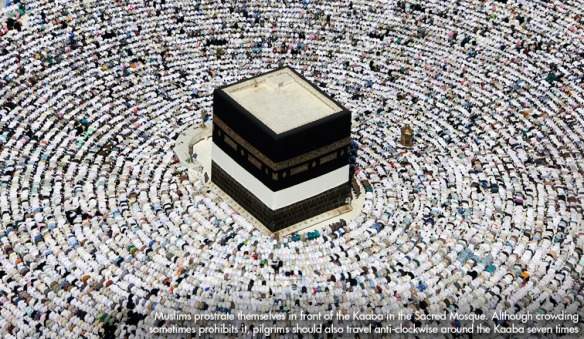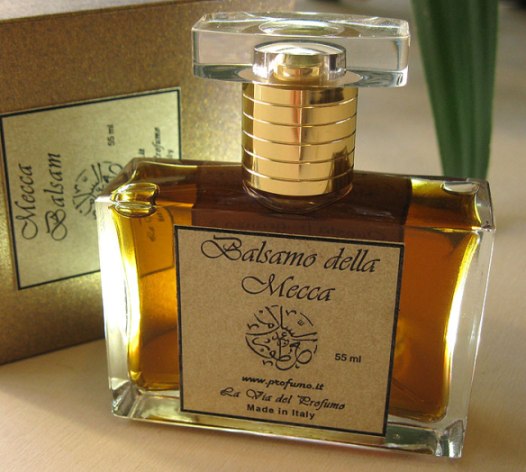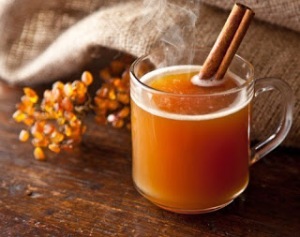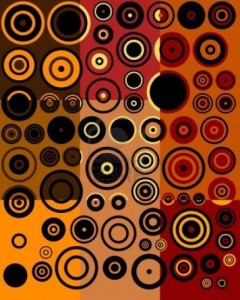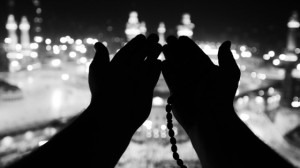The road to Mecca, filled with the scent of millions of pilgrims radiating amber, incense, and spice. A mysterious Sufi mystic garbed in blue robes of the desert who has been called a “genius” and “a magician” with natural essences. And the desire to recreate “the perfume of the mosques and the music of the wind organs in cathedrals.”
That last line alone stopped me in my tracks with its beautiful imagery, the poetry of perfumery focused on the very heart of the Middle East: Mecca. Mecca Balsam is the creation of the perfumer, Dominique Dubrana, but I have to admit, I have no clue as to how I should call his perfume house. Many sites list it as La Via del Profumo, his website is called Profumu.it, but American decanting services and perfumistas often refer to the line as “AbdesSalaam Attar (profumo.it)” or AbdesSalaam Attar. The latter is the nom de plume he uses on Basenotes, where he is a contributor and with whom he’s created a few perfume series. I’ve decided to opt for the very long name of “AbdesSalaam Attar La Via del Profumo” at first, and then to shorten it to “AbdesSalaam Attar.”
I’ve been interested in the highly respected, almost legendary, Dominique Dubrana for a while. The New York Times had a fascinating article from 2010 entitled “Smellbound” in which Jim Lewis describes the man and his creations:
One overcast afternoon last May I sat in a small atelier in a tiny town in the hills of Rimini, Italy. Across from me sat a man in royal blue robes and a matching blue turban, with a long gray beard and kohl-rimmed eyes; on his desk, and on the shelves behind him, in a cabinet by the door — all over the room — there were small amber-tinted glass bottles, scores of them, and as we spoke he would take one up, open the top, hand it to me and invite me to smell the contents. This went on for hours. It was why I’d come: to meet Dominique Dubrana, a 54-year-old Frenchman living in Italy, a Sufi convert, a grand eccentric and a genius of sorts. […]
Dubrana is a perfumer, and there is no one quite like him working anywhere in the world today. [¶] For one thing, he has no store — and no corporation to answer to and no marketing budget. He invents his own stuff, bottles it and sells it only online, relying on word of mouth to spread his name. […][¶] More important, he uses all natural ingredients, an ancient craft in the modern world, where synthetic molecules make up as much as 90 percent of most commercial perfumes and where some familiar notes — most musks, for example — are almost impossible to find in their natural state. [¶][…]
Luca Turin, the author of “Perfumes: the Guide,” a visiting scientist at M.I.T. and the capo of perfume critics, says: “He’s one of these very rare examples of a natural-born perfumer. He seems to be incredibly sure-footed, in a way which reminds me of François Coty. There are dozens of all-natural perfumers; I don’t pay much attention to them, because every time I do I get a bunch of hideous crap. But I love his fragrances. I don’t think anyone can touch him in the field of natural perfumery.”

Masjid al Haraam in Mecca, the Sacred or Grand Mosque, which is perhaps the holiest place in Islam. Source: upww.us
I haven’t had much luck with natural perfumery thus far, but I’ve heard nothing but raves for the AbdesSalaam Attar line. My problem was where to start. There were an overwhelming number of his fragrances listed on Surrender to Chance, but one name caught my eye: Mecca Balsam. The perfume was inspired by Mr. Dubrana’s trip to Mecca, and the smells of the city. A quick check of the Profumo.it website description, where the fragrance is called Balsamo della Mecca, and I was sold. It was so damn evocative!
In Mecca, the scents of Labdanum resin, of Benzoin, frankincense and of the precious Agar wood invade the streets together with the 4 million pilgrims who pour to the streets 5 times every day, walking to the great mosque like river. […][¶]
The trail of a million scents in the wake of the pilgrims at Mecca raptures the nose of the visitor and make this travel an unforgettable experience for a westerner little used to such a profusion of olfactory stimulus.
I have imagined the perfume at Mecca itself while walking in the mist of the pilgrims, and I had already found its name there; “Mecca Balsam”. I would compose it with the smells and fragrances that are omnipresent in the holy city, it would be it’s olfactory signature.
Back to Italy, my memories still fresh and my spirit still filled with the pilgrimage, I started blending the essences of my perfumer’s organ.
The grave and austere note of Labdanum, deep and resinous, at once sacred and profane, is the center of gravity of “Mecca Balsam”.
Wrapped in the amber fragrance of Tonka and in the mystic aroma of the Arabic Frankincense, Labdanum wildness is tamed in an almost ecclesiastic scent that evocates at once the perfume of the mosques and the music of the wind organs in cathedrals.
The scent of raw Tobacco, always present in the background, is like an anchor that binds the base accord, giving them a common denominator.
The flowery notes of Indian Tuberose and of Damask Rose enrich the base of the balsam in the fashion of Arabic fragrances, bestowing to the perfume an opulence worthy of the precious aromatic elixirs worn by the royal family of Saudia.
Mecca Balsam is a fragrance that is liked by men and women alike, its aroma is warming, full, aromatic, and somehow gives a fatherly sense of security.
The succinct list of notes would be:
tonka, Arabic frankincense, labdanum, raw tobacco, Indian tuberose and Damask rose.
Mecca Balsam opens on my skin with intense booziness, like sharp, young cognac, followed by fruit and tobacco. The latter smells definitely raw, like the juice from tobacco wads that some men and American baseball players chew. The notes are infused with smoky incense and a rough labdanum, but there is also a hint of something leathered, rubbery, and a little mentholated at the edges. The strongest impression is of the tobacco juice and a dirty, rough amber, flecked lightly by incense. It’s all very gritty, dark, leathery in feel, almost verging on the dirty, raw, untamed and masculine. At the same time, however, it’s also sweet, soft, warm, and strong. The fragrance hovers a few inches above the skin, at most, but is extremely potent and dense when sniffed up close.
I don’t smell the florals in Mecca Balsam in any distinct, individual, or significant way. However, the hint of something rubbery, almost diesel-like, and mentholated makes me wonder if it stems from the tuberose. There is a whiff of something underlying the note that makes me think of how the flower has been deconstructed in Serge Lutens‘ Tubereuse Criminelle. With Mecca Balsam, the floral aspect never appears fully, but there is the faintest suggestion of tuberose after about 5 minutes. It’s more akin to dirty indoles, though it’s never fecal, sour, or even particularly lush. Whatever it is, the floral undertone is extremely muted and quickly fades away entirely.
About 20 minutes into its development, Mecca Balsam changes completely. All the rough edges suddenly start to soften, as the fragrance becomes smoother and smoother. From its initial start of lots of raw, concentrated tobacco juice over a heart of dirty, warm amber with smoke, the perfume suddenly turns into… cinnamon orange spiced tea! The similarities were so overwhelming that I actually hunted in my pantry for an errant box of the stuff (which I don’t like very much), brewed a cup, and compared the two aromas. Mecca Balsam is obviously richer, deeper, thicker, and warmer in smell than a thin liquid, but I’m telling you: Orange Spice!
I don’t understand any of it, but what emanated from my skin for almost the next 12 hours was various levels of cinnamon orange tea over a base of warm, dark, slightly leathered amber with tobacco. The cinnamon is extremely dominant, but it never approaches the fiery aspect of “red hots” cinnamon candies. It’s much smoother and mellower than that. I suspect it stems from the Tonka being impacted by the other accords, but I have no explanation for the distinct smell of orange that appears by its side. The fruited aspect waxed and waned in strength, but there was always some aspect of a sweet citrus edge; at first, it was right on top with the cinnamon, but eventually, it became a more muted note by the edges.
The base notes are interesting. The amber never smelled like a lot of labdanum that I encounter: it was never toffee’d, nutty, or honeyed, and even the leathery nuance was subtle. As a whole, it merely smelled like an amorphous, really warm, golden base with a dirty edge. The tobacco eventually lost its rawness and was generally folded within the amber, though occasionally it was much more noticeable in its own right. The whole thing was dry and lightly flecked by the tiniest amount of incense, but Mecca Balsam was never a really smoky scent on me. For the most part, it was primarily just black tea that was highly spiced with cinnamon and sweetened with oranges.
At the end of the 6th hour, Mecca Balsam shifts a little. It takes on a slightly powdered touch at the edges that occasionally makes me think of powdered orange drinks. It also becomes a complete skin scent. Still, I was surprised by how long it took for Mecca Balsam to fade in strength. It never had more than soft sillage to begin with, but for an all-natural fragrance, it was surprisingly strong when sniffed up close. Perhaps that is due, in part, to the rawness or concentration of certain notes like the cinnamon or the tobacco. Even more surprising was how long Mecca Balsam lasted on my perfume-consuming skin. I could smell faint traces of it well after the 12th hour, and it finally died away as a blur of warm, spiced, ambered tea about 13.5 hours from the start.
I have to admit, I was disappointed with Mecca Balsam. The story, the inspiration, the magical, mystical, Bedouin and Sufi look of Mr. Dubrana, all led me to expect something very different. Perhaps nothing would have measured up to the images in my head, or to my growing fascination with Mr. Dubrana, but raised expectations are not the real cause. Rather, it’s the notes and how they manifested itself on my skin. I love labdanum and incense, I enjoy tobacco fragrances, and heavy, rich orientals are my absolute favorite. I did not expect Bigelow’s Orange Spice tea!
The greatest problem for me personally was the tobacco. At the start, it was incredibly dirty in a way that was simply too intense and sharp for my personal tastes. Even when it subsequently became muted, relatively speaking, and was folded into the amber of the base, I still struggled with it. I can take dirty labdanum or leather, but the rawness of the tobacco was perhaps a few steps too far on the dirty scale. I kept envisioning American baseball players in some 1950s movie with a wad of tobacco bulging in their lip, and spitting out streams of raw juice into a spittoon. It’s unappealing mentally, and the scent isn’t so refined on an olfactory level either. Again, in fairness, the scent softened and mellowed quite a bit after the first two hours, but then we go back to Orange Pekoe and cinnamon tea. It’s not my personal favorite.
Skin chemistry obviously plays a huge role in how perfumes bloom on the skin, but I have to wonder if batch variations might also be a factor as well. I have the impression, perhaps mistaken, that Mr. Dubrana does everything by hand and on a relatively small-scale. If so, then that may account for some variations, as Mecca Balsam is a much applauded scent with reviews that sometimes seem to describe something extremely different than what I experienced. All of this is apart from the fact that there seem to be at least two different versions of Mecca Balsam, from the Arabian series that I tested, to an early version made in 2010 for Jim Lewis who wrote The New York Times article, as well as what might be an extrait.
There are many blog reviews for Mecca Balsam, and a common thread between them is a discussion of the amber-tobacco heart. A number of reviewers also noted a “meditative” aspect as well. Take the assessment by The Non-Blonde who wrote, in part:
I don’t think I’ve ever fully grasped the idea of a meditative perfume until I smelled Mecca Balsam [….] I’ve never actually experienced a perfume that took me there.
Why is Mecca Balsam different? It might be the depth and rawness of the natural ingredients. There are no minimalistic tricks and gimmicks here- this is the real thing. […][¶] The first whiff of Mecca Balsam is nothing short of stunning. It makes you stop, take a deep breath and take it all in. […] What you get here is dark and dry, resinous and smoky. It creates a certain mood right away. It’s very deliberate and there’s nothing casual about this scent. The labdanum and tobacco are the most pronounced notes on my skin. They make me feel like I’ve stepped into a dark, sacred place out of time. Sweet incense is burning in the corner and the red and pink lights of sunrise are felt more than actually seen through an elaborately ornamented window.
It’s a mental and emotional place, not a real one, but it feels safe and honest and allows one to take a good introspective look. The scent is strong and would affect your surrounding, but at the same time it’s personal and reflective. [Emphasis in the original, but not underlined.]
Suzanne of Eiderdown Press seemed to feel something a bit similar, writing:
its opening notes have all the gravitas of a prayer: they are weighty and deeply resinous—almost medicinally so, such that I could swear I smell the astringent lash of clary sage among them, though perhaps it is a figment of my imagination, as the perfumer does not list it among the notes. After five minutes, the labdanum and frankincense combination become smokier and more ash-like, with a little bit of tarriness that makes me also wonder if there might be a hint of castoreum, too, in the composition. As it continues to dry down, the fragrance softens considerably but continues to unfold. The smokiness is still there but it is ever so lightly sweetened by the balsamic and ambery tonka note, and then rounded out by the warmth of tobacco. The floral notes go unnoticed, as their function here seems to be that of a soothing olfactory balm, if you will—taking the edge off the rawer notes and lending softness and depth to the scent .
What is most impressive about Balsamo Della Mecca is that it does what most all-natural perfumes don’t do: it stays with you. After its weighty opening, it becomes this wonderfully breathy tobacco scent that you fear is going to disappear on you—it becomes a tobacco-y skin scent, really, a rare thing among tobacco scents—and remarkably, it goes the distance. I get at least seven hours of wear from two generous spritzes of Balsamo Della Mecca.
Kevin from Now Smell This had an experience a little closer to mine, at least in terms of spices:
Balsamo della Mecca begins with rich, ‘leather-y’ labdanum and smoky frankincense. As the fragrance develops, interesting facets emerge — accords that smell of unsweetened cinnamon, “cola” and musky tobacco. The fragrance is dense and only lightens after hours of wear when the notes seem to “dry out” and turn powdery — a lovely phase when frankincense and benzoin/tonka predominate. […][¶] I don’t detect much tuberose and rose in Balsamo della Mecca … and agarwood is “overcome” by labdanum and frankincense. Balsamo della Mecca is a great incense perfume, wearable by men and women.
I was surprised at all-natural Balsamo della Mecca’s lasting power: over 10 hours. And in case you’re “worried,” it is not a sillage-monster. Balsamo della Mecca is an excellent layering scent and adds depth (and a touch of incense) to floral perfumes (it digests citrus fragrances in minutes).
Basenotes reviewers are entirely positive about the fragrance which is entered in the site under the name Balsamo della Mecca. Both men and women alike describe it in terms of uniqueness, spirituality, beauty, or a meditative feel. Just two examples:
- Tall, dark and soulful. [¶] This one is an experience rather than a list of notes. Warm and comforting, this is a scent I reach for when it’s been a long day or promises to be one. It wraps me up. To be honest if scents can have a soul then I think this one has the soul of a healer. A sexy healer! […] warm, enduring and strangely compassionate[.]
- this one is all about labdanum: resinous , spicy , with some tobacco and loads of frankincense, that i mixed for some pepper [¶] it opens up like a blast of some herbaceous spices including pepper , for a soup :)….gourmand like to my nose, and then goes on heated by the body heat for hours, like it melts layer by layer, its dense, resinous, sweetish scent with lot of spices, a little bit dark [¶] this one is unique, and i like it but i did get the feeling when i wore it that its not for this world 🙂 its for special purposes , some religious ceremonies….transcendental, the name fits it perfectly it does feel like balsamic!healing the soul 🙂
Even one person who was not moved by the scent gave it a positive review, finding Mecca Balsam to be both “complex” and “stellar”:
If I can sum this scent in one word it would be this: COMPLEX. It took me more than a few days of wearing before realizing I came nowhere close to unraveling its mysteries.
On my skin BALSAMO DELLA MECCA plays a symphony comprising of three main accords: balsamic labdanum, dry frankincense and aromatic tobacco, interspersed with the nuanced sweetness of dried fruits. The rose note is subtle at best, wearing close to the skin. Overall I find the scent warm and inviting with a texture that is dry but not quite as dusty nor as Lutens-like syrupy as I had initially feared. I don’t know if it’s my skin but the tobacco is surprisingly tenacious.
Despite its formidable charms, it failed to move me though I smiled a little when I caught a glimpse of a cleverly hidden tuberose. […] I also suspect some of the more glowing reviews could have been influenced at least in part by its rather exotic name and the association it carries with the annual Muslim pilgrimage to the holy city of Mecca. But it matters not. For what it’s worth, I think this release is nothing short of ‘stellar’.
Obviously my experience was completely different, though the common themes of cinnamon, strong tobacco, amber, and undertones of leather and incense are all there. How one interprets a note is naturally subject to one’s personal mental filters, and for me, it was Orange Spice black tea with amber and various degrees of raw spittoon tobacco juice. I’m afraid I don’t get any meditative or spiritual qualities from the scent, and I agree with the commentator above that the fragrance’s name and associations might have influenced some of the talk of spirituality on Basenotes and elsewhere. Then again, skin chemistry is key, and perhaps there are some batch variations as well.
I don’t think Mecca Balsam is for everyone. I think some people would find it far too masculine and, depending on skin chemistry, perhaps even dirty, thanks to the raw tobacco juice. That said, I encourage those who adore incense, labdanum, or Middle Eastern scents above all else to give Mecca Balsam a try. The fragrance is very well done, and my experience was obviously outside the norm. Plus, samples aren’t hard to obtain, and the perfume is offered in a variety of sizes, starting at €36 or about $50 for 15 ml. There are 20 positive reviews in a variety of languages from English to Russian and Asian linked on the Profumo.it site that attest to the fact that the fragrance is something different, original, and complex. Maybe you’ll get my Lapsang Souchang cinnamon orange tea with tobacco bouquet, or maybe you’ll experience the dark, dry, meditative, incense fragrance that takes you to Mecca at dawn. Either way, it’s quite an experience, and undoubtedly like nothing else you’ve really tried.




